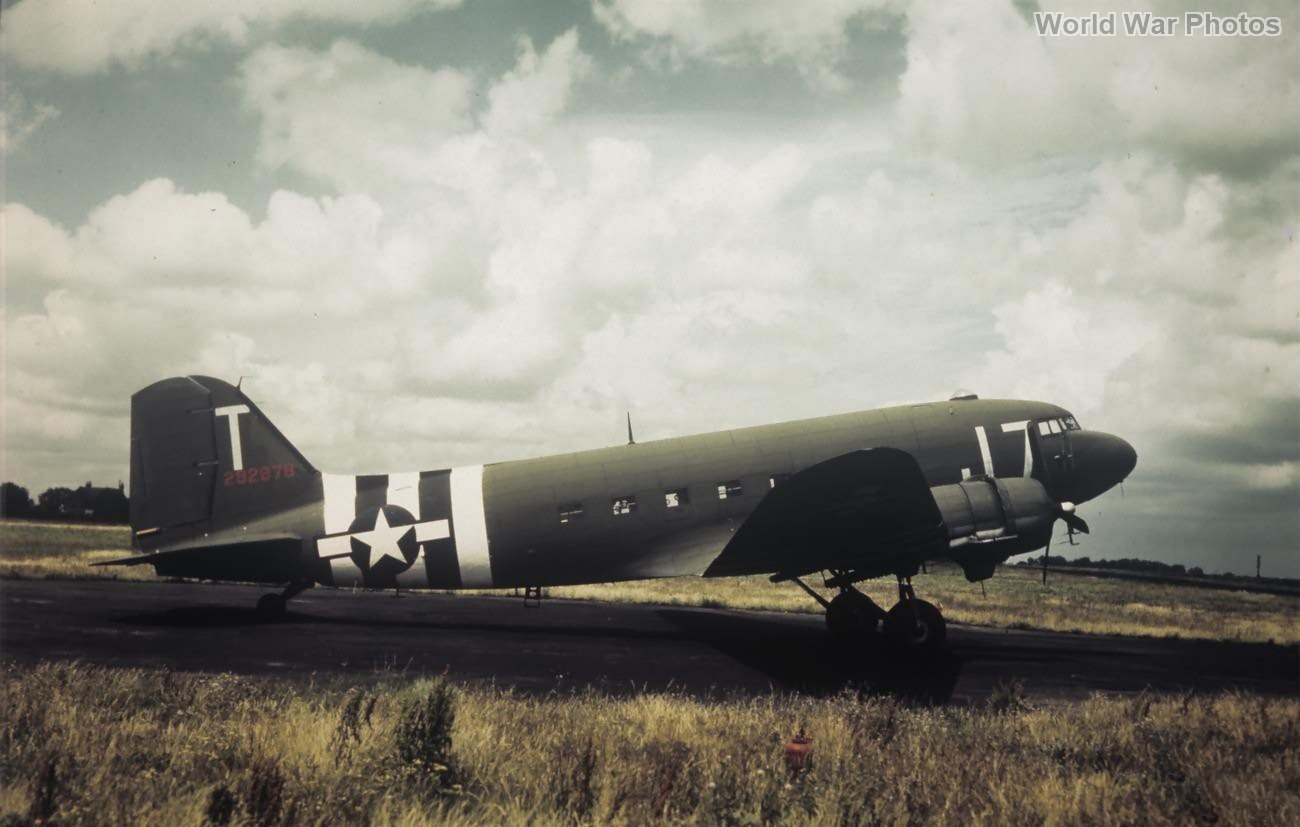The 442nd Troop Carrier Group (442nd TCG) – overview:
Operational History
Arrival and Training in England (March – May 1944)
- March 1944: The 442nd TCG arrived in England to continue its training in preparation for the upcoming invasion of Europe.
- Bases:
- Fulbeck, Lincolnshire: The group was stationed here starting 29 March 1944.
- Weston Zoyland, Somerset: The group moved to this base on 12 June 1944, shortly after D-Day.
Normandy Invasion (June 1944)
- 6 June 1944 (D-Day):
- Mission: The 442nd TCG dropped paratroops from 45 aircraft at Sainte-Mère-Église, a key location in the Normandy invasion.
- 7 June 1944: Conducted 56 re-supply sorties to support the ongoing battle, ensuring that the airborne troops were well-equipped.
- Recognition: The group was awarded the Distinguished Unit Citation (DUC) for its outstanding performance during these operations.
- Post-D-Day Operations:
- Following the Normandy invasion, the 442nd TCG engaged in general cargo flying to support the Allied advance in Europe.
Invasion of Southern France (July – August 1944)
- July 1944:
- Detachment to Italy: The 303rd, 304th, and 305th Troop Carrier Squadrons (TCS) were detached to Follonica, Italy, to participate in operations in Southern Europe.
- 15 August 1944: The group took part in the invasion of Southern France, towing gliders and dropping paratroops directly into the battle area.
- End of August 1944:
- The detachment returned to England after successfully contributing to the operations in Southern France.
Operation Market Garden and Subsequent Operations (September 1944 – March 1945)
- September 1944:
- Mission: The 442nd TCG participated in Operation Market Garden, the ambitious but ultimately flawed Allied operation aimed at securing bridges in the Netherlands. The group towed 161 CG-4 troop-carrying gliders during this operation.
- October 1944 – March 1945:
- General Transport Work: The group resumed its general cargo transport duties, supporting various fronts as the Allies pushed further into occupied Europe.
- Crossing of the Rhine (March 1945):
- 24 March 1945: The 442nd TCG was involved in the airborne crossing of the Rhine River, towing 48 gliders in a significant operation that helped establish a foothold on the eastern side of the Rhine, marking the beginning of the final push into Germany.
Post-VE Day Operations and Occupation Duties (May – December 1945)
- Post VE-Day:
- After the end of hostilities in Europe on 8 May 1945, the 442nd TCG was tasked with evacuating released prisoners of war and continuing to provide essential air transport services during the early days of the occupation.
- Post-War Stationing:
- The group remained in Europe, operating from bases in France and Germany, including Munich/Riem, as part of the United States Air Forces in Europe (USAFE), following the inactivation of the 9th Air Force in December 1945.
Squadrons and Codes
- 303rd Troop Carrier Squadron (TCS): J7
- 304th Troop Carrier Squadron (TCS): V4
- 305th Troop Carrier Squadron (TCS): 4J
- 306th Troop Carrier Squadron (TCS): 7H
Bases
- Fulbeck, Lincolnshire (England): 29 March 1944
- Weston Zoyland, Somerset (England): 12 June 1944
- Peray, Basse Normandie (France): 5 October 1944
- St. Andre-de-l’Eure, Ile-de-France (France): 6 November 1944
- Munich/Riem, Germany: 11 September 1945
Commanding Officers
- Col. Charles M. Smith: Commanded the group from its deployment in September 1943.
- Col. John C. Kilborn: Took command on 25 September 1945.
- Lt. Col. Paul A. Jones: Assumed command on 4 October 1945.
Aircraft
- C-47 Skytrain: The primary transport aircraft used for troop drops, supply missions, and glider towing.
- C-53 Skytrooper: A variant of the C-47, optimized for transporting troops.
- CG-4 Glider: Utilized for carrying troops and equipment in airborne operations.
Unit Decorations
- Distinguished Unit Citation (DUC): Awarded for the group’s exceptional performance during the operations in France on 6-7 June 1944.
Aircraft Markings
- Camouflage: Standard USAAF two-color camouflage.
- Squadron Codes: White or sky-colored squadron code letters located on the forward section of the fuselage.
- Call Letters: Positioned on the tail just above the aircraft serial number.
